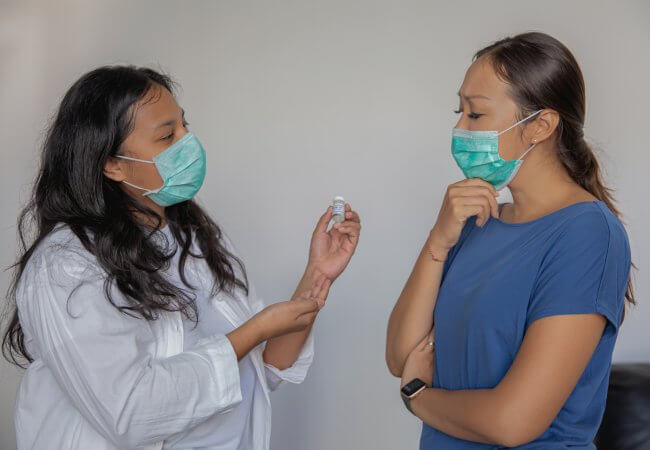
Sep 16, 2021
Nurse Vaccine Hesitancy Isn’t Surprising
As we find ourselves in the midst of another COVID-19 surge with hospitals once again reaching capacity, there has been much discussion about COVID-19 vaccination and whether this had become a “pandemic of the unvaccinated.” What might surprise some is the rate of vaccine hesitancy among healthcare workers, many of whom have been on the frontlines throughout the COVID-19 pandemic.
Vaccine hesitancy is defined by the World Health Organization as a “delay in acceptance or refusal of vaccines despite availability.” Despite the availability of multiple highly effective and safe COVID-19 vaccines and the prioritization of healthcare workers for early vaccination, an August 2021 report from the COVID States Project found that 27% of healthcare facility employees remain unvaccinated. In long term care facilities like nursing homes where residents are among those most vulnerable to severe COVID-19 infection and death, Centers for Disease Control and Prevention (CDC) data through April 4, 2021 show that only 56.8% of long term care facility healthcare workers were vaccinated against COVID-19. The same CDC data showed the lowest rates by profession were for nurses (56.7%) and aides (45.6%). A July 2021 survey of almost 5,000 nurses conducted by the American Nurses Association found that 1 in 8 nurses have not been vaccinated against COVID-19.
Some of the most high-profile cases of unvaccinated healthcare workers include 117 Houston Methodist Hospital staff members who sued to overturn the hospital’s COVID-19 vaccine mandate and a COVID-19 outbreak at a Kentucky skilled nursing facility that was traced back to an unvaccinated employee. Nurses’ COVID-19 vaccine hesitancy has even led to the delay of patient care such as when all four nurses at a Kansas County Health Department refused to administer COVID-19 vaccines to the public.
It is of particular importance that nurses are commonly the most vaccine hesitant members of the healthcare workforce. Nurses have been named the most trusted profession in the U.S. for the last 20 years and have high levels of direct patient contact. Most people in the U.S. also cite their personal healthcare providers as their most trusted source of COVID-19 vaccine information. Not only are vaccine hesitant nurses highly trusted sources of COVID-19 vaccine (mis)information, but their vaccination status and related likelihood to be infected with COVID-19 can also affect whether a healthcare facility is adequately staffed to provide safe patient care.
However, this is not a COVID-19-specific issue for healthcare workers or nurses. Previous research on the seasonal influenza vaccination practices of hospital workers has found that nurses consistently have the lowest flu vaccination rates of all healthcare worker positions surveyed. In the early COVID-19 vaccine hesitancy research, the trend of nurses having the lowest vaccine intent among healthcare workers continues to hold true. Only assistant nurses and aides had lower rates of COVID-19 vaccine intent. My own research found that California registered nurses surveyed from August 14, 2020 through December 2, 2020 were just as vaccine hesitant as other U.S. West Coast adults based on the Vaccine Attitudes Examination Scale, a validated questionnaire that measures hesitancy toward vaccines in general. Additionally, 29.7% of nurses I surveyed reported that they would be unlikely to receive a COVID-19 vaccine if one were available.
I worry how vaccine mandates and healthcare workers’ vaccine hesitancy may affect staffing in the coming months at hospitals and nursing homes, where short staffing has been commonplace long before the COVID-19 pandemic. Hospital CEOs have gone on record sharing the calculus they face of whether they will lose more employees to COVID-19-related illness and quarantine than the number who would quit in response to a COVID-19 vaccine mandate. Already, Nebraska is specifically targeting unvaccinated nurses to fill staffing shortages at state facilities by advertising their lack of a COVID-19 vaccine mandate. What will this mean for states with healthcare worker vaccine mandates or the nursing home industry? Will there be a great migration of healthcare workers to states without vaccine mandates? Will healthcare workers leave the field or retire to avoid mandated vaccination? Answers to these questions will be especially relevant to healthcare in the U.S. as we approach cold and flu season when hospitals are historically more heavily impacted.
 Linda Vuong, MS, RN, CCRN, is a pulmonary hypertension nurse coordinator at UC Davis Health who studies vaccine hesitancy among nurses.
Linda Vuong, MS, RN, CCRN, is a pulmonary hypertension nurse coordinator at UC Davis Health who studies vaccine hesitancy among nurses.
